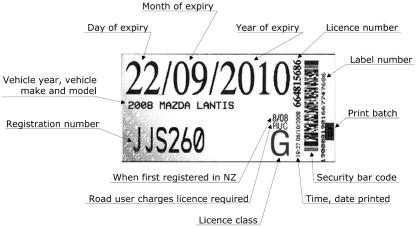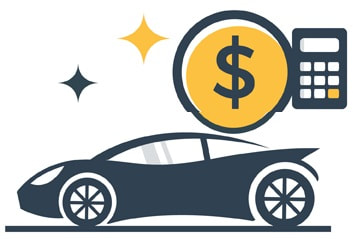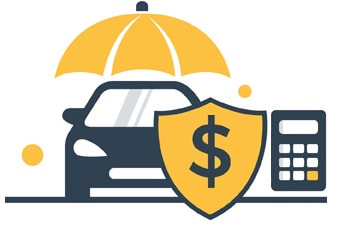Car Registration - The Definitive New Zealand Guide
Our guide outlines the car registration process, associated costs, must-know facts and frequently asked questions.
Updated 10 September 2023
Summary
Our guide covers:
- Car registration has been a point of uncertainty for many New Zealanders. With the rise in electric vehicle (EV) sales due to the clean car discount, many New Zealanders are purchasing new vehicles to take advantage of these subsidies. However, this means many will have to register a new car, which they may not have done for decades.
- This guide explains how to register your car, the key difference between car registration and "rego", the steps to renew your rego and the key costs associated with car registration.
- It's important to flag that this guide uses the word "car" as most MoneyHub readers will be dealing with cars, but many of these rules apply to all vehicles on public roads.
Our guide covers:
What is the Car Registration Process?
All vehicles in New Zealand must be registered by the New Zealand Transport Authority (NZTA) before you can legally drive them on public roads. Generally, registration is a one-off activity that identifies you as the person legally responsible for the vehicle. When a car is first registered, it's inspected for safety, certified and added to the Motor Vehicle Register. You'll need a form of identification when registering a car.
Why do I need car registration?
The main reason New Zealanders need car registration is safety. Car registration ensures that all vehicles on the roads are held to a high standard, ideally reducing any accidents resulting from loose tires, falling objects or car breakdowns. In addition, establishing a record of all the cars on the road (in the Motor Vehicle Register) means that the police or road authorities can locate, understand and address any issues that arise on the road.
Where can I go to register my car?
You'll likely have to visit an authorised agent when registering a car. New Zealand doesn't have an online platform for first-time car registrations. The list of places you can register (or subsequently cancel) your car includes:
Where can I go to renew my car registration (rego)?
The New Zealand government has made it easy to renew their car licence. The easiest and fastest way to do this is through NZTA's online portal (which you can find here). You’ll need your licence plate number or renewal notice and a means of payment (Visa, Mastercard etc.).
- Vehicle Testing New Zealand (VTNZ)
- The Automobile Association (AA)
- Vehicle Inspection New Zealand (VINZ)
- New Zealand Post Offices (NZ Post)
What are the Costs Associated with Registering Your Car?
There are three main costs regarding car registration in New Zealand:
- Registration fees
- Licencing (rego) fees
- Administration fees
1. Registration fee
When you first register a car, you pay a fee for the licence to drive it on public roads. You will also get a vehicle licence label to place on the vehicle (usually on the windscreen). The typical registration fee can range from $150 to $400, with most people paying $250 - $300.
- For a more detailed breakdown of the typical registration costs in New Zealand, check out NZTA's breakdown here.
2. Rego fees
Generally, a rego needs to be renewed every 12 months to continue driving it on public roads in New Zealand. The average cost to renew your rego for 12 months will cost approximately $100 (but will vary depending on the vehicle itself and whether it's petrol, diesel or electric).
- For a more detailed breakdown of the typical rego costs in New Zealand, check out NZTA's breakdown here.
3. Administration fees
Renewing your rego also has administration fees you will have to pay (in addition to the rego fee itself). This fee is the cost to NZTA for providing the online platform and software that New Zealanders use to renew their rego. This cost is usually minimal, with most people paying less than $10 each time. Administration costs are usually included in the total bill through NZTA's online platform.
- You can find the various administration costs from the NZTA here.
Must-Know Facts about Car Registration
Make sure you're complying with the legal requirements of owning a car
Owning a vehicle comes with many advantages, but it also has equal responsibilities. At all times, you'll want to ensure that your car:
If you don't meet the above conditions, you may incur traffic infringements and get fined unexpectedly.
- Has a Warrant of Fitness (WoF)
- Has a valid rego
- Is being driven in a safe manner
If you don't meet the above conditions, you may incur traffic infringements and get fined unexpectedly.
While rego is used frequently in New Zealand, remember there's a difference between initial car registration and rego.
Technically, registration differs from your vehicle licence (commonly called a "rego"). Generally, registration is done once and is used to identify the car to an owner. This information gets recorded in the Motor Vehicle Register managed by NZTA, which lists all the valid vehicles in New Zealand. Your car registration never "expires" unless you cancel it.
On the other hand, a car "rego" must be completed more frequently and does expire. You will usually have to renew your rego every 12 months to ensure you have the appropriate permissions to drive on public roads. A rego also ensures that your car is kept up to the right standards to ensure safety for yourself and others.
On the other hand, a car "rego" must be completed more frequently and does expire. You will usually have to renew your rego every 12 months to ensure you have the appropriate permissions to drive on public roads. A rego also ensures that your car is kept up to the right standards to ensure safety for yourself and others.
Frequently Asked Questions - Registration vs Warrant of Fitness and More:
I plan to be out of the country for an extended period. Can I put my rego on hold?
You can elect to put your rego on hold if you know you'll not be driving your car for at least three months. While this prevents you from legally driving the car on the road, it also means your rego is not active, ensuring that you don't pay rego fees during the hold period.
More details: You can put your car rego on hold through NZTA’s form here.
More details: You can put your car rego on hold through NZTA’s form here.
I think my rego is expiring soon, but I haven't received an email about it. How can I check when my rego expires?
If you haven't received any notifications about your rego expiring and are worried that you may infringe on the law by driving your car without a valid rego, you can check the exact date your car rego will expire through NZTA's online portal here.
My car no longer works, and I don't want to renew the rego for it. How can I cancel my registration?
NZTA has a comprehensive step-by-step process if you want to cancel a car's registration. However, it's important to note that cancelling a car's registration will remove it from the Motor Vehicle Register (a master list of all cars in New Zealand that are legal on public roads), and you will not be able to drive this car on public roads.
More details: You can find more information on cancelling car registration here.
More details: You can find more information on cancelling car registration here.
I’m considering buying a car from Trade Me. How can I see if the car has a rego?
The most common way that New Zealanders use to find out if cars for sale have a rego is to use online platforms, such as the NZTA’s expiry query or CarJam. Much of this data is free, but you may want to pay for additional information about the car above and beyond what is publicly available.
How often do I have to renew the rego?
Regos are usually valid for up to 12 months. Therefore, you'll likely have to renew your rego at NZTA every 6-12 months, depending on how long the current rego will last.
Does car registration vary by city or region?
No. Unlike places like America or Australia, New Zealand doesn’t have car rego regions, so if you register your car with NZTA, you won’t have to register it anywhere else as it's valid in every corner of New Zealand.
What is a Warrant of Fitness (WoF)?
A Warrant of Fitness (WoF) is a semi-regular check to ensure that the vehicle functions properly and adheres to all safety standards. NZTA has authorised certain mechanics around New Zealand to conduct WoFs (known as WoF agents). There are over 3,000 WoF agents across New Zealand; our WoF guide offers more details.
WoF agents will look at things such as the car's tyres, brakes, lights, steering, and other aspects that impact the safety of yourself and others on the road. The frequency of when you need to get a WoF will depend on the age of your car. Generally, the older the car, the more frequently you'll need to get a WoF (as the car is more likely to need servicing). For more information, check out NZTA's guide on it here.
WoF agents will look at things such as the car's tyres, brakes, lights, steering, and other aspects that impact the safety of yourself and others on the road. The frequency of when you need to get a WoF will depend on the age of your car. Generally, the older the car, the more frequently you'll need to get a WoF (as the car is more likely to need servicing). For more information, check out NZTA's guide on it here.
Do I need to ensure the car I'm looking at has a Warrant of Fitness?
Yes, it's suggested to check that the car you're looking to buy has a valid WoF. If the car you buy doesn't have a valid WoF, you risk purchasing a car that has a fault or isn't road-worthy. This risk can lead to unexpected costs above and beyond the purchase price.
Know This: A WoF doesn't always mean the car is in perfect condition. A WoF only signals that the car is safe to drive on public roads right now. Furthermore, this certification doesn't mean that it will continue to run perfectly in the future. Ordinary wear and tear will still occur, and the car may need additional repairs or maintenance over time.
Know This: A WoF doesn't always mean the car is in perfect condition. A WoF only signals that the car is safe to drive on public roads right now. Furthermore, this certification doesn't mean that it will continue to run perfectly in the future. Ordinary wear and tear will still occur, and the car may need additional repairs or maintenance over time.
How does rego relate to a WoF?
- A rego is a licence showing that the vehicle is legally driving on public roads.
- A Warrant of Fitness (WoF) is a semi-regular check to ensure that the vehicle functions properly and adheres to all safety standards.
- You must ensure your vehicle has both of these to drive on public roads in New Zealand. A WoF will need to be done more frequently for older cars. For more information on WoFs, check out NZTA's website here.
What happens if my car fails the WoF inspection?
If your car fails the WoF inspection, you'll need to address the issues flagged in the WoF (either by a mechanic or another authorised repair shop) and take another WoF inspection. If the repairs are completed within 28 days of the initial WoF, you can get the car re-inspected without incurring additional costs. You can find more information on this policy through NZTA's website here.
The receipt permits you to get the automobile constant and re-inspected within 28 days, barring any extra payment. If you get the repairs done outside the 28-day window, you'll have to pay for another WoF inspection.
The receipt permits you to get the automobile constant and re-inspected within 28 days, barring any extra payment. If you get the repairs done outside the 28-day window, you'll have to pay for another WoF inspection.
I’ve just sold a car on Trade Me. What are the first things I need to do?
- You'll need to let NZTA know you're no longer the car's owner. You can do this online through NZTA's form here.
- The main reason you want to do this quickly is that if the new owner infringes on any rules and starts to rack up parking tickets or fines, your name will still be registered to the car so that you may get these bills. Although you can probably dispute these, submitting the form first is much less hassle and avoids these issues.
- It's recommended to fill out this form after finalising the car sale before physically handing the keys to the new owner.
I’ve just bought a car on Trade Me. What are the first things I need to do?
- Similar to the situation above, you'll want to let NZTA know that you've purchased a vehicle so they can assign you the car's legal owner in their records. Again, you can do this through NZTA's form here.
- Note that there is a fee (around $10) to make this change. Additionally, as the registered owner of a vehicle, you will now be accountable for your car. These responsibilities include keeping it in a safe place, paying off any parking infringements or fees and ensuring it is driven safely.
Can I pay my rego bill online?
Yes. The NZTA rego renewal form will prompt you to input your credit card or internet banking details. NZTA uses the POLi payment system to allow you to do this.
What is a VIN?
A Vehicle Identification Number (VIN) is a form of car identification unique to each vehicle. Most cars will have a VIN. VINs ensure that the vehicle you're looking to buy is the vehicle you end up getting. VINs are checked regularly at each Warrant of Fitness.
What will happen if I get pulled over, and my car registration isn't valid?
If you get pulled over, and your registration isn't valid, you'll get an infringement offence and have to pay a fee.
Both my WoF and rego are expired. Which one do I get renewed first?
If your WoF and rego have expired, you'll need to renew both before legally driving on New Zealand public roads. A prerequisite to getting your rego renewed is a valid WoF, so the first thing you want to do is get your WoF. Once you have your WoF, you can renew your rego, and you'll be good to go.
What should I know when looking to buy a car online?
- When researching a car to buy, make sure you thoroughly check the condition that the car is in (ideally in person).
- Once you've signed and formally purchased a car, it's very hard to back out of the deal if you've found something materially wrong with the car.
- Unless they have intentionally misrepresented the quality of the car, ultimately, it's up to you as the buyer to do the proper due diligence when purchasing a car.
- That's why it's important to ensure the car has a recent/valid WoF. A valid WoF is a great sign that the car is safe and in a legally drivable condition.
- Our guide to buying a used car comprehensively outlines the process and must-know tips.
What’s the distinction between buying from a registered car dealership versus a private owner (through platforms such as Trade Me)?
The main difference between purchasing a car from a dealership versus a private owner is that you get the benefit of additional consumer rights by law when buying through a dealership. On the other hand, purchasing a car from individuals through platforms such as Trade Me typically comes with fewer protections, meaning the onus is on you as the buyer to do the proper legwork to check that what you're buying is what you want. Generally, getting a refund from a marketplace like Trade Me is also more difficult than from a dealership.
From this perspective, purchasing from a dealer is safer than a private owner. However, dealers normally factor this into the prices they charge, which can be more costly than purchasing through Trade Me or other car marketplaces.
From this perspective, purchasing from a dealer is safer than a private owner. However, dealers normally factor this into the prices they charge, which can be more costly than purchasing through Trade Me or other car marketplaces.
Our related guides:
- CarJam Review and CarJam vs MotorWeb Reports
- Car Insurance
- AMI vs AA Insurance vs Cove vs State vs Tower vs Trade Me Insurance
- Car Insurance Excess
- How to Get Cheaper Car Insurance
- Car Insurance Calculator
- Third Party Car Insurance
- No Claims Bonus
- Cheapest Cars to Insure
- Car Insurers Directory
- Car Insurance Glossary
- Car Valuations
- Buying a Used Car
- Cut Driving Costs
- Compare Car Finance and Understand the Ongoing Costs using our Car Finance Calculator
- Mechanical Breakdown Insurance (MBI)
- Guaranteed Asset Protection Insurance (GAP)
- Payment Protection Insurance (PPI)





